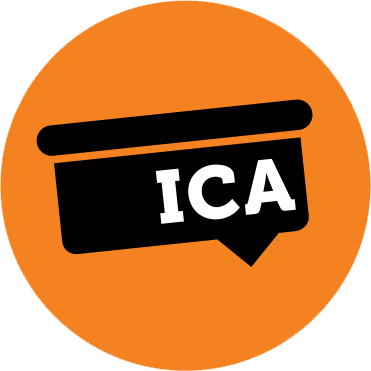THE ICF COMPETENCIES AND MARKERS
A FRAMEWORK FOR CERTIFIED OR CREDENTIALED COACHES
THE INTERNATIONAL COACH FEDERATION
ICA was first accredited by the International Coach Federation (ICF) back in 2004 as an ACTP (now level 2) and was one of the very first schools to have an online (e-learning) curriculum accredited. Since then we have expanded into 126 countries, with thousands of students. We made the decision to align with the ICF over other local or international options such as RTO, IAC, WABC etc. for very specific reasons:
- The ICF continue to be the most established peak body in coaching worldwide.
- Coaching is a global profession with local and global client opportunities.
THE ICF COMPETENCIES
The International Coach Federation (ICF) has established a set of core coaching competencies that outline the skills and abilities required for professional coaching. These competencies form a comprehensive framework for professional coaching practice and guide coaches in their interactions with clients, helping them achieve meaningful and sustainable results. They are available via the ICF website in 15 languages. In addition, International Coach Academy has translated these competencies also into Chinese.
THE PCC MARKERS
The ICF Markers are specific indicators of coaching proficiency used to assess and evaluate coaches for the purpose of certification and credentialing. Coaches who competently demonstrate coaching at ACC (Associate Certified Coach), PCC (Professional Certified Coach) or MCC (Master Certified Coach) level are able to apply for the related credentials.
HOW ARE THE ICF COMPETENCIES THE SAME, BUT DIFFERENT?
The ICF competencies and the ICF markers are both frameworks used by ICF Accredited schools and the ICF itself to determine coaching proficiency. However, they serve different purposes and provide different levels of detail.
The ICF competencies outline the general skills and abilities required for professional coaching. These competencies provide a broad framework that guides coaches in their practice. They cover areas such as establishing trust, active listening, powerful questioning, and goal setting. The competencies are meant to be comprehensive and encompass the overall skills and behaviors expected of a professional coach.
The ICF markers are specific indicators or descriptors within each competency that further elaborate on the expected behaviors and skills at different levels of coaching proficiency. The markers provide more granular guidance and help assessors evaluate a coach's proficiency and skill level. They serve as benchmarks for determining whether a coach is performing at the ACC, PCC or MCC level.
The markers provide detailed descriptions of the behaviors, attitudes, and approaches that a coach should demonstrate to meet the expectations of the respective competency. For example, within the competency of "Active Listening," the markers might include indicators such as "Demonstrates attentive and non-distracted listening," "Summarizes and reflects accurately," or "Tunes in to the client's emotions and underlying messages."

THE ICF COMPETENCIES
Translated and available for download in 16 languages
- Arabic- Download here
- Chinese - Download here
- Danish - Download here
- Dutch - Download here
- English - Download here
- French - Download here
- German - Download here
- Italian - Download here
- Japanese - Download here
- Korean - Download here
- Latvian - Download here
- Polish - Download here
- Portuguese - Download here
- Russian - Download here
- Spanish - Download here
- Turkish - Download here
The 8 ICF Competencies and Related Markers
Competency 1: Demonstrates Ethical Practice
ICF Competencies
- Demonstrates personal integrity and honesty in interactions with clients, sponsors and relevant stakeholders
- Is sensitive to clients’ identity, environment, experiences, values and beliefs
- Uses language appropriate and respectful to clients, sponsors and relevant stakeholders
- Abides by the ICF Code of Ethics and upholds the Core Values
- Maintains confidentiality with client information per stakeholder agreements and pertinent laws
- Maintains the distinctions between coaching, consulting, psychotherapy and other support professions
- Refers clients to other support professionals, as appropriate
PCC Markers
Familiarity with the ICF Code of Ethics and its application is required for all levels of coaching. Successful PCC candidates will demonstrate coaching that is aligned with the ICF Code of Ethics and will remain consistent in the role of coach.
Competency 3: Establishes and Maintains Agreements
ICF Competencies
- Explains what coaching is and is not and describes the process to the client and relevant stakeholders
- Reaches agreement about what is and is not appropriate in the relationship, what is and is not being offered, and the responsibilities of the client and relevant stakeholders
- Reaches agreement about the guidelines and specific parameters of the coaching relationship such as logistics, fees, scheduling, duration, termination, confidentiality and inclusion of others
- Partners with the client and relevant stakeholders to establish an overall coaching plan and goals
- Partners with the client to determine client-coach compatibility
- Partners with the client to identify or reconfirm what they want to accomplish in the session
- Partners with the client to define what the client believes they need to address or resolve to achieve what they want to accomplish in the session
- Partners with the client to define or reconfirm measures of success for what the client wants to accomplish in the coaching engagement or individual session
- Partners with the client to manage the time and focus of the session
- Continues coaching in the direction of the client’s desired outcome unless the client indicates otherwise
- Partners with the client to end the coaching relationship in a way that honors the experience
PCC Markers
- Coach partners with the client to identify or reconfirm what the client wants to accomplish in this session.
- Coach partners with the client to define or reconfirm measure(s) of success for what the client wants to accomplish in this session.
- Coach inquires about or explores what is important or meaningful to the client about what they want to accomplish in this session.
- Coach partners with the client to define what the client believes they need to address to achieve what they want to accomplish in this session.
Competency 5: Maintains Presence
ICF Competencies
- Remains focused, observant, empathetic and responsive to the client
- Demonstrates curiosity during the coaching process
- Manages one’s emotions to stay present with the client
- Demonstrates confidence in working with strong client emotions during the coaching process
- Is comfortable working in a space of not knowing
- Creates or allows space for silence, pause or reflection
PCC Markers
- Coach acts in response to the whole person of the client (the who).
- Coach acts in response to what the client wants to accomplish throughout this session (the what).
- Coach partners with the client by supporting the client to choose what happens in this session.
- Coach demonstrates curiosity to learn more about the client.
- Coach allows for silence, pause or reflection.
Competency 7: Evokes Awareness
ICF Competencies
- Considers client experience when deciding what might be most useful
- Challenges the client as a way to evoke awareness or insight
- Asks questions about the client, such as their way of thinking, values, needs, wants and beliefs
- Asks questions that help the client explore beyond current thinking
- Invites the client to share more about their experience in the moment
- Notices what is working to enhance client progress
- Adjusts the coaching approach in response to the client’s needs
- Helps the client identify factors that influence current and future patterns of behavior, thinking or emotion
- Invites the client to generate ideas about how they can move forward and what they are willing or able to do
- Supports the client in reframing perspectives
- Shares observations, insights and feelings, without attachment, that have the potential to create new learning for the client
PCC Markers
- Coach asks questions about the client, such as their current way of thinking, feeling, values, needs, wants, beliefs or behavior.
- Coach asks questions to help the client explore beyond the client’s current thinking or feeling to new or expanded ways of thinking or feeling about themself (the who).
- Coach asks questions to help the client explore beyond the client’s current thinking or feeling to new or expanded ways of thinking or feeling about their situation (the what).
- Coach asks questions to help the client explore beyond current thinking, feeling or behaving toward the outcome the client desires.
- Coach shares—with no attachment—observations, intuitions, comments, thoughts or feelings, and invites the client’s exploration through verbal or tonal invitation.
- Coach asks clear, direct, primarily open-ended questions, one at a time, at a pace that allows for thinking, feeling or reflection by the client.
- Coach uses language that is generally clear and concise.
- Coach allows the client to do most of the talking.
Competency 2: Embodies a Coaching Mindset
ICF Competencies
- Acknowledges that clients are responsible for their own choices
- Engages in ongoing learning and development as a coach
- Develops an ongoing reflective practice to enhance one’s coaching
- Remains aware of and open to the influence of context and culture on self and others
- Uses awareness of self and one’s intuition to benefit clients
- Develops and maintains the ability to regulate one’s emotions
- Mentally and emotionally prepares for sessions
- Seeks help from outside sources when necessary
PCC Markers
These elements take place over the course of a coach’s professional journey and cannot be fully captured in a single moment in time. However, certain elements of this Competency may be demonstrated within a coaching conversation.
Competency 4: Cultivates Trust and Safety
ICF Competencies
- Seeks to understand the client within their context which may include their identity, environment, experiences, values and beliefs
- Demonstrates respect for the client’s identity, perceptions, style and language and adapts one’s coaching to the client
- Acknowledges and respects the client’s unique talents, insights and work in the coaching process
- Shows support, empathy and concern for the client
- Acknowledges and supports the client’s expression of feelings, perceptions, concerns, beliefs and suggestions
- Demonstrates openness and transparency as a way to display vulnerability and build trust with the client
PCC Markers
4.1: Coach acknowledges and respects the client’s unique talents, insights and work in the coaching process.
4.2: Coach shows support, empathy or concern for the client.
4.3: Coach acknowledges and supports the client’s expression of feelings, perceptions, concerns, beliefs or suggestions.
4.4: Coach partners with the client by inviting the client to respond in any way to the coach’s contributions and accepts the client’s response.
Competency 6: Listens Actively
ICF Competencies
- Considers the client’s context, identity, environment, experiences, values and beliefs to enhance understanding of what the client is communicating
- Reflects or summarizes what the client communicated to ensure clarity and understanding
- Recognizes and inquires when there is more to what the client is communicating
- Notices, acknowledges and explores the client’s emotions, energy shifts, non-verbal cues or other behaviors
- Integrates the client’s words, tone of voice and body language to determine the full meaning of what is being communicated
- Notices trends in the client’s behaviors and emotions across sessions to discern themes and patterns
PCC Markers
- Coach’s questions and observations are customized by using what the coach has learned about who the client is or the client’s situation.
- Coach inquires about or explores the words the client uses.
- Coach inquires about or explores the client’s emotions.
- Coach explores the client’s energy shifts, nonverbal cues or other behaviors.
- Coach inquires about or explores how the client currently perceives themself or their world.
- Coach allows the client to complete speaking without interrupting unless there is a stated coaching purpose to do so.
- Coach succinctly reflects or summarizes what the client communicated to ensure the client’s clarity and understanding.
Competency 8: Facilitates Client Growth
ICF Competencies
- Works with the client to integrate new awareness, insight or learning into their worldview and behaviors
- Partners with the client to design goals, actions and accountability measures that integrate and expand new learning
- Acknowledges and supports client autonomy in the design of goals, actions and methods of accountability
- Supports the client in identifying potential results or learning from identified action steps
- Invites the client to consider how to move forward, including resources, support and potential barriers
- Partners with the client to summarize learning and insight within or between sessions
- Celebrates the client’s progress and successes
- Partners with the client to close the session
PCC Markers
- Coach invites or allows the client to explore progress toward what the client wanted to accomplish in this session.
- Coach invites client to state or explore the client’s learning in this session about themself (the who).
- Coach invites the client to state or explore the client’s learning in this session about their situation (the what).
- Coach partners with the client to design post-session thinking, reflection or action.
- Coach partners with the client to consider how to move forward, including resources, support or potential barriers.
- Coach invites the client to consider how they will use new learning from this coaching session.
- Coach partners with the client to design the best methods of accountability for themselves.
- Coach celebrates the client’s progress and learning.
- Coach partners with the client on how they want to complete this session.



